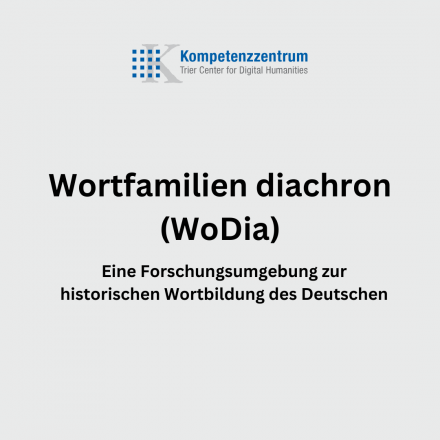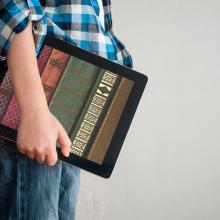Word families diachronic (WoDia)
A research environment for the historical word formation of German

Project Management: Dr Thomas Burch (Universität Trier - Trier Center for Digital Humanities (TCDH)) · Prof. Dr. Jost Gippert (Goethe Universität Frankfurt am Main - Vergleichende Sprachwissenschaft) · Dr. Sarah Ihden (Christian-Albrechts-Universität zu Kiel) · Dr. Ralf Plate (Akademie der Wissenschaften und der Literatur | Mainz – Arbeitsstelle des Mittelhochdeutschen Wörterbuchs Trier) · Prof. Dr. Ingrid Schröder (Universität Hamburg - Institut für Germanistik)
Sponsors: Deutsche Forschungsgemeinschaft (DFG)
Running time: -
Contact person (TCDH): Dr Thomas Burch
Research Area: Digital Edition and Lexicography
Keywords: #Wörterbuchnetz, Digital Technologies and Tools, Research and Teaching
DFG long-term project at the Universities of Frankfurt am Main, Hamburg, Kiel and Trier and the Academy of Sciences and Literature Mainz.
Project management: Dr. Thomas Burch (TDCH), Prof. Dr. Jost Gippert (Frankfurt), Dr. Sarah Ihden (Kiel), Dr. Ralf Plate (Mainz / Frankfurt), Prof. Dr. Ingrid Schröder (Hamburg).
In the project "Diachronic Word Families," a database-based online accessible research environment is being constructed as a tool for research and teaching, embedding the Old High German, Middle High German, Old Saxon, and Middle Low German vocabulary into a comprehensive word family structure. This environment allows for determining the place of each word within its word family based on a hierarchical structural formula. The database draws from the vocabulary of the reference dictionaries of these historical varieties, linked with online resources of dictionaries (dictionary entries, collections of examples) as well as with the reference corpora Old German, Middle High German, and Middle Low German / Low Rhenish.
WoDia enables the investigation of processes of change in the historical vocabulary as a whole through observing the changes in word families (expansion, reduction, modification) and the use of individual word formation means. Integrated studies on the development of word families (dissertations) within the project will firstly demonstrate how the essential components of language development (word formation, borrowing) manifest in the modification of word family structures and how formal and semantic ambiguity (e.g., of affixes) is reflected in language change processes. Secondly, using composition as an example, it will discuss the role of categorical vagueness in the analysis and how it affects the interpretation of linguistic findings. Thirdly, it will enable an evaluation of the research environment through the exemplary examination of two word families.
The database contains for each lemma the assignment to a word family as well as a structural formula illustrating the individual word formation elements and the word formation hierarchy. The etymologically corresponding lemmas and word families of the different language stages are linked, allowing for cross-stage analysis. Annotations in the word family database (e.g., regarding word formation structure) are supplemented by linking their lemmas with the online offerings of dictionaries and with the reference corpora through the diverse information of these resources (contexts, textual attribution, diasystematic classification).
The word family database will be searchable online through a (graphical) user interface, for example, by lemmas of a word class with a selected prefix in a specific language stage. Different representations are provided for query results, such as lemma and word family lists with the associated annotations (for individual language stages as well as cross-language stages), as well as interactive visualizations.
The research environment is intended to be hosted by the Trier Center for Digital Humanities. The digital copies necessary for the database creation of the dictionaries not yet available online will additionally be published online in the Trier Dictionary Network.
Related projects: The Dictionary Network
Team TCDH
Bianca Ottenberg
E-mail: s2biotte uni-trier [dot] de
uni-trier [dot] de
Phone: +49 651 201-3365
Dr Thomas Burch
E-mail: burch uni-trier [dot] de
uni-trier [dot] de
Phone: +49 651 201-3364
Felix Thielen
E-mail: thielenf uni-trier [dot] de
uni-trier [dot] de
Phone: +49 651 201-3365
Julia Fischer
E-mail: hennemannj uni-trier [dot] de
uni-trier [dot] de
Phone: +49 651 201-3849
Utpal Pandey
E-mail: utpalp utexas [dot] edu
utexas [dot] edu
Phone: +49 651 201-3365







